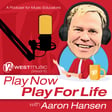
Episode 11: Discovering Dalcroze – Music Through Movement and Play
What happens when music education goes beyond notes on a page and into the whole body? In this episode of Play Now, Play for Life, host Aaron Hansen sits down with Lori Forden, Chair of the Board of Trustees for the Dalcroze Society of America, and Dr. Jeremy Dittus, Diplôme Supérieur and Director of The Dalcroze School of Music and Movement. Together, they explore how Dalcroze education transforms rhythm, solfege, and improvisation into powerful movement-based learning experiences.
Dalcroze Society of America: https://dalcrozeusa.org/
Learn more about this podcast at https://www.westmusic.com/playnowplayforlife
Sign up for West Music emails for exclusive content and discounts! https://www.westmusic.com/playnowplayforlife/emailsignup
Visit our website for all of your musical needs! https://www.westmusic.com/
Follow us on social media!
YouTube: https://www.youtube.com/c/westmusic
Instagram: www.instagram.com/westmusiccompany
Facebook: www.facebook.com/westmusic
Tiktok: www.tiktok.com/@westmusiccompany
X: www.twitter.com/westmusic
Pinterest: www.pinterest.com/westmusic
